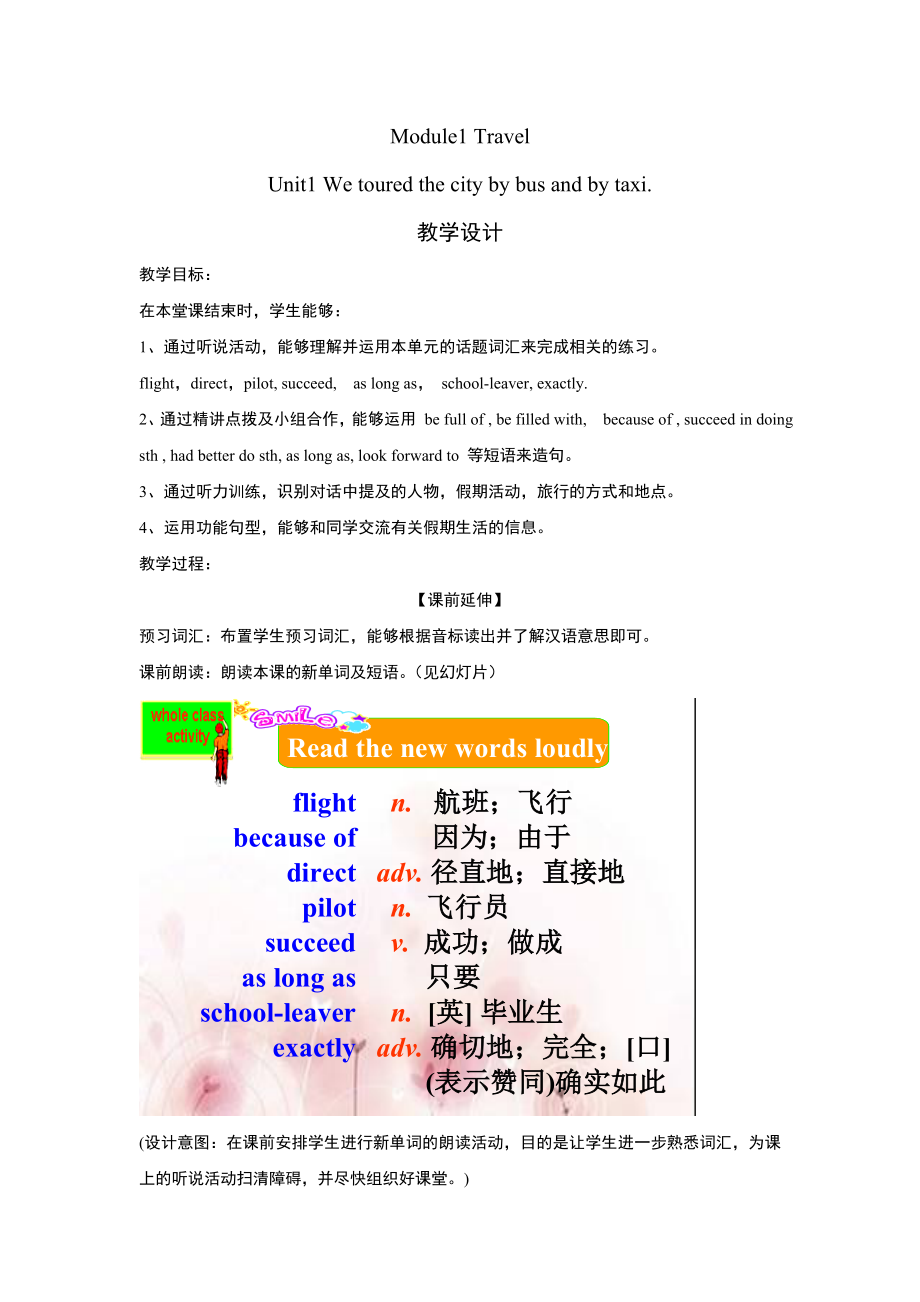《外研版九年級(jí)下冊(cè)英語 Module 1 Unit 1 教學(xué)設(shè)計(jì)》由會(huì)員分享�,可在線閱讀,更多相關(guān)《外研版九年級(jí)下冊(cè)英語 Module 1 Unit 1 教學(xué)設(shè)計(jì)(7頁(yè)珍藏版)》請(qǐng)?jiān)谘b配圖網(wǎng)上搜索。
1�、Module1 Travel
Unit1 We toured the city by bus and by taxi.
教學(xué)設(shè)計(jì)
教學(xué)目標(biāo):
在本堂課結(jié)束時(shí),學(xué)生能夠:
1�、通過聽說活動(dòng),能夠理解并運(yùn)用本單元的話題詞匯來完成相關(guān)的練習(xí)�。
flight,direct�,pilot, succeed, as long as, school-leaver, exactly.
2�、通過精講點(diǎn)撥及小組合作,能夠運(yùn)用 be full of , be filled with, because of , succeed in doing sth , had better do sth, a
2�、s long as, look forward to 等短語來造句。
3�、通過聽力訓(xùn)練,識(shí)別對(duì)話中提及的人物�,假期活動(dòng),旅行的方式和地點(diǎn)�。
4、運(yùn)用功能句型�,能夠和同學(xué)交流有關(guān)假期生活的信息。
教學(xué)過程:
【課前延伸】
預(yù)習(xí)詞匯:布置學(xué)生預(yù)習(xí)詞匯�,能夠根據(jù)音標(biāo)讀出并了解漢語意思即可。
課前朗讀:朗讀本課的新單詞及短語�。(見幻燈片)
(設(shè)計(jì)意圖:在課前安排學(xué)生進(jìn)行新單詞的朗讀活動(dòng),目的是讓學(xué)生進(jìn)一步熟悉詞匯�,為課上的聽說活動(dòng)掃清障礙�,并盡快組織好課堂�。)
【課內(nèi)探究】
Step 1: Lead-in:
展示自己在北京旅游時(shí)在天安門前拍的照片,及長(zhǎng)城�、故宮、頤和園等旅游景點(diǎn)
3�、及出租車、公交車的圖片來導(dǎo)入本節(jié)課的學(xué)習(xí)�。
(設(shè)計(jì)意圖:用自己的照片及旅游景點(diǎn)的圖片來導(dǎo)入新課,容易激發(fā)學(xué)生的學(xué)習(xí)興趣�,調(diào)動(dòng)學(xué)生學(xué)習(xí)的積極性。)
Step 2: Pre-listening:
(設(shè)計(jì)意圖:在描述旅游經(jīng)歷時(shí)�,最常見的信息就是乘坐了哪些交通工具�,所以本活動(dòng)結(jié)合交通工具圖片,以師生問答的形式來談?wù)撏瑢W(xué)們最喜歡和最不喜歡乘坐的交通工具�,為下面的對(duì)話內(nèi)容做了很好的鋪墊)
Step 3: While-listening
Task 1: Listen and choose the correct answers.
1. How long did Lingling stand
4、on the train?
A. Over 2 hours. B. Over 3 hours. C. Over 4 hours.
( ) 2. Why is travel so difficult in winter?
A. Because of the weather. B. Because of the people.
C. Because of the Spring Festival.
( ) 3. What are Daming and Betty looking forward to at the end of the term?
A
5�、. The school-leavers’ party.
B. The school-leavers’ concert.
C. The school-leavers’ exam.
( ) 4. When do you think the conversation takes place?
A. At the end of the term.
B. At the middle of the term.
C. At the beginning of the term.
Task 2: Listen again and complete t
6、he table.
?
Where
What
How
Lingling
Henan
went to see her (1)____________.
by train
Tony
(2)_____
went to stay with his family.
by(3)______
Daming
Hong Kong
(4)________ a boat to Lantau Island and went to Disneyland.
?by plane
and boat
Betty
Beijing
took a
7�、(5)________ by coach to the Summer Palace ;Went for a long walk (6)_______the lake.
? by bus, by(7)_____and by coach
Say some sentences with the help of the table.
Eg: Lingling went to see her grandparents in Henan Province by train.
(設(shè)計(jì)意圖:一聽為選擇題,比較簡(jiǎn)單�,讓學(xué)生從整體上感知對(duì)話信息,了解對(duì)話大意�。二聽為表格題,此題培養(yǎng)學(xué)生獲取細(xì)節(jié)信
8�、息�,從對(duì)話到表格的信息轉(zhuǎn)移能力�。完成聽力后,讓學(xué)生根據(jù)表格信息說句子�,此活動(dòng)有利于培養(yǎng)學(xué)生的組織句子能力。)
Step 4:Post-listening:
一.Read the dialogue and complete the passage with proper words:
1. Lingling went to see her grandparents in Henan Province during the holiday. Her travel was a bit _______, because winter is the busiest season in China
9�、_______ ______ the Spring Festival. The train ______ _____ _____ people and she had to _____ for over three hours
2. Tony spent his holiday in the UK. He ________ his family during the holiday and he is _________ today.
3. Daming went to Disneyland in Hong Kong. Though the plan left _______ late,
10、the pilot _________________ on time. And they enjoyed themselves there.
4. Betty had quite a good time in Beijing. They toured the city by ______ and by ______. And they _____________ by coach to the Summer Palace and went for ____________ around the lake.
(設(shè)計(jì)意圖:自讀對(duì)話�,完成短文,此題有助于學(xué)生進(jìn)一步熟悉對(duì)話內(nèi)容�,并初步感知對(duì)話中
11、的重點(diǎn)短語的用法�。)
二、Language points: (教師精講�,學(xué)生造句訓(xùn)練)
1. The train was full of people, and I had to stand for over six hours. 火車上擠滿了人,我不得不站了6個(gè)多小時(shí)�。
be full of 意為“充滿……;裝滿……”,其同義詞組為 be filled with�。
漢譯英:
(1). 瓶子里裝滿了水。
(2).教室里盛滿了學(xué)生�。
2. Well, it’s the busiest season in China because of the Spring Festival
12、. 由于春節(jié)�,冬季成了中國(guó)交通最繁忙的季節(jié)。
because?of意為“因?yàn)?;由于”,后可接名詞�、代詞或V-ing形式�。
because 連詞�,引導(dǎo)原因狀語從句
漢譯英:
因?yàn)橄掠辏覀儾荒艹鋈ド⒉健?
3. But the pilot succeeded in landing on time.
不過飛行員成功地按時(shí)著陸了�。
succeed in doing… 表示“成功地做……”。
漢譯英:
(1)�、他成功地解出了這道數(shù)學(xué)題。
(2)�、我成功地登上了長(zhǎng)城。
4. But now, we'd better get back to work.
但是這回兒�,我們最好還
13、是回去學(xué)習(xí)吧�。
had better do sth. 最好做某事,其否定形式為
had better not do sth.最好不要做某事
漢譯英:
(1)�、你最好照顧好你自己。
(2)�、你最好不要花費(fèi)太多的時(shí)間玩電腦游戲�。
5. There’s nothing to worry about as long as you work hard.
只要你努力,沒什么好擔(dān)心的�。
as long as在這里引導(dǎo)條件狀語從句,表示“只要”�,時(shí)態(tài)遵循主將從現(xiàn)的原則。
(1)�、只要我活著,我就會(huì)幫助你�。
(2)�、只要你不把書弄臟�,這書你就可以借。
6. We’re all
14�、looking forward to it!
我們都盼著呢!
look forward to sth / doing sth 期待著�、、�、、或
盼望著�、、�、
(1)、我們都期待著明天的足球比賽�。
(2)、今年暑假�,她期待著去參觀長(zhǎng)城。
(設(shè)計(jì)意圖:通過精講點(diǎn)撥并輔以造句練習(xí)�,使學(xué)生理清并學(xué)會(huì)應(yīng)用節(jié)課的重點(diǎn)知識(shí)。)
三�、listen and read:
(1) Ask students to read the conversation after the video.
(2) Students read the conversation in groups of three.
15、
(3) Students role play the conversation.
(設(shè)計(jì)意圖:讓學(xué)生跟隨對(duì)話視頻朗讀對(duì)話�,有助于學(xué)生模仿對(duì)話人物的語音、語調(diào)�,關(guān)注對(duì)話人物的態(tài)度體現(xiàn)。隨后的分角色朗讀對(duì)話及分組展示有助于使學(xué)生感受真實(shí)的對(duì)話情景�。)
Step5:學(xué)以致用
Talk about your holiday with your partner.
Eg :
A: What did you do during the holiday?
B:
A: How did you get there?
B:
A: How was your travel? / What has
16�、happened?
B:
A: What are you looking forward to this term?
B:
(設(shè)計(jì)意圖:通過生生對(duì)話�,運(yùn)用功能句型交流自己的假期生活,達(dá)到學(xué)以致用的目的�。)
Step6、當(dāng)堂檢測(cè)
一�、 根據(jù)漢語提示完成句子
1.______________(歡迎回來),everyone.
2. The train_______________. (擠滿了人)
3. We _________________(成功地完成了)the task.
4. You will be successful___________________(只要你努力
17�、學(xué)習(xí))
5. It’s cold outside ,you_____________________ .(最好穿上外套)
6. I’m ___________________________. (期待見到你)
二、用方框內(nèi)所給單詞的恰當(dāng)形式填空�。
coach flight succeed plane school-leaver
1. The first _________ was flown by the Wright brothers over 100 years ago.
2. A _______ is a large comfortable bus
18、used for sightseeing or long-distance travel.
3. Will the head teacher attend the ___________ party next Friday?
4. It’s only about forty minutes’ ________ from Taiyuan to Beijing by air.
5. I’m sure you will ______ if you work hard.
(設(shè)計(jì)意圖:檢測(cè)一:鞏固本課所學(xué)的短語�,檢測(cè)二,鞏固本課所學(xué)的生詞�。)
Step 7: Summary
Think a
19、bout what you have learned today.
本課時(shí)主要短語和句型
1. be full of…
2. because of
3. succeed in doing…
4. had better do sth
5. as long as
6. — What did you do during the winter holiday?
— I went to see my grandparents in Henan Province by train.
(設(shè)計(jì)意圖:引導(dǎo)學(xué)生整理本節(jié)課的重點(diǎn)短語和句型�,讓他們進(jìn)一步明確本節(jié)課的重點(diǎn)內(nèi)容,同時(shí)為課后的復(fù)習(xí)鞏固做準(zhǔn)備�。)
【課后提升】
Step8: Homework
1. Have a talk with your parents and get more information about their holiday. Then make a short dialogue with your partner.
2. Preview the new words and expressions in Unit 2.
 外研版九年級(jí)下冊(cè)英語 Module 1 Unit 1 教學(xué)設(shè)計(jì)
外研版九年級(jí)下冊(cè)英語 Module 1 Unit 1 教學(xué)設(shè)計(jì)

